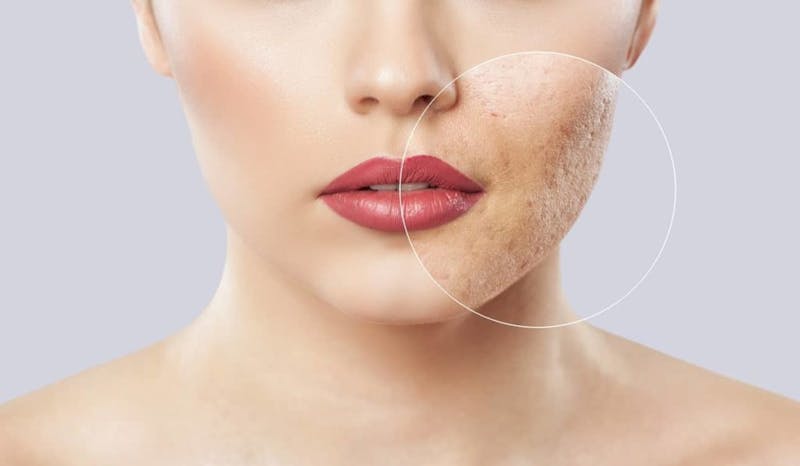

Dealing with acne can take a massive toll on your self-esteem, sometimes for years and years on end. For most people, though, that glorious day eventually arrives: you either find that magic acne treatment or you finally grow out of your teenage cystic acne altogether. Once you’re completely acne-free, you might feel like a weight has lifted off your shoulders.
Unfortunately, you might also be left with multiple years’ worth of scars and hyperpigmentation. You may even start to wonder — will these acne scars remain forever?
Luckily, there are treatments that, with repeated sessions, can reduce the appearance of acne scars or prevent them from occurring altogether. Here’s what you need to know.
Types of Acne Scars
Some scars can fade faster than others. That all depends on a wide variety of factors. But first, it’s important to define what kind of scarring your acne has left behind.
If you’re looking at multiple discolored or red spots, then you’re probably looking at standard hyperpigmentation — scarring that is quite common following moderate acne. Sometimes, these spots can be caused or worsened by sun damage, so make sure you’re using SPF every day. Certain acne medications like benzoyl peroxide and exfoliators like AHA can increase your skin’s sensitivity to the sun and worsen the look of these sunspots, so keep that in mind.
Furthermore, there are three kinds of post-inflammatory color changes that may appear after your skin has healed from a breakout.
- Post-inflammatory erythema may appear in pink or purple flat patches across the skin
- Post-inflammatory pigmentation presents itself as brown marks. It is typically found in deeper skin tones and in people who tan easily
- Post-inflammatory hypopigmentation presents as light or white marks on the skin
These marks can last a few months but typically fade on their own. You can also use a vitamin C serum to help them fade even faster. However, some deep scars affect your skin’s texture and can leave your face feeling bumpy and uneven. These types of scarring can include:
- Ice Pick Scars
- Rolling Scars
- Boxcar Scars
These are more severe and require more time to heal — anywhere from a few months to a year or more. They are also more common in people who have suffered from cystic acne in the past. Some scars may require complete resurfacing of the face through laser treatments, chemical peels, injectables, or dermabrasion in order to improve.
Why Does Acne Leave Scars?
You’re more likely to be left with scars if you are a serial skin picker when dealing with your breakouts. Irritating your skin can cause harsh scarring and permanent damage, so the next time you get a breakout, leave it alone. Picking at your skin can leave an acne lesion, which repairs itself much like a wound. In some cases, fibrous tissue forms, leaving a pit or discolored spot.
What Can I Do About My Acne Scars At Home?
There are several over-the-counter products you can use to diminish the appearance of scars and hyperpigmentation. However, for the most dramatic results, visit a plastic surgeon or dermatologist to begin a more rigorous treatment plan. Some over-the-counter and at-home suggestions:
Vitamin C can lighten and brighten the skin; however, you must make sure to incorporate sunscreen into your skincare routine if you choose to use this as a serum to help with your hyperpigmentation.
Use a chemical exfoliator at home, like glycolic acid or alpha hydroxy acid. These substances are available as toners, peels, masks, serums, and moisturizers. However, always do a patch test before using a new chemical exfoliator to make sure you won’t have an adverse reaction to the product. Apply a small dab to your neck or the back of your hand. Wait 15 to 20 minutes to test whether or not it irritates your skin. If you don’t feel a sharp burning sensation, you’re good to go!
Most skincare advice always includes staying hydrated. Drinking an adequate amount of water daily can help improve your skin, especially if your acne has left you with severe scars.
You can get a stronger and more effective chemical peel by booking a treatment with a plastic surgeon. Other professional skincare options, like laser treatments, are ideal for deep ice pick scars, or for anyone who wants to get rid of an orange peel texture from scarring. Some of these treatments remove the first layer of damaged skin to reveal healthier, scar-free tissue underneath. Others heat the deeper tissues to encourage collagen production.
Getting Professional Help for Your Acne Scars
Acne scars don’t have to last forever if you take the right precautions and handle your skin with care once your acne has cleared up. If you’re already struggling with acne scars, however, then you may want to contact Dr. Edward Buckingham at Buckingham Center for help.
Dr. Buckingham is a double board-certified plastic surgeon specializing in skincare and facial plastic surgery in Austin, TX. Learn more about the clinic’s hours and services, and hear some amazing testimonials on Dr. Buckingham’s website. You can also call 512.401.2500 to schedule a consultation.



